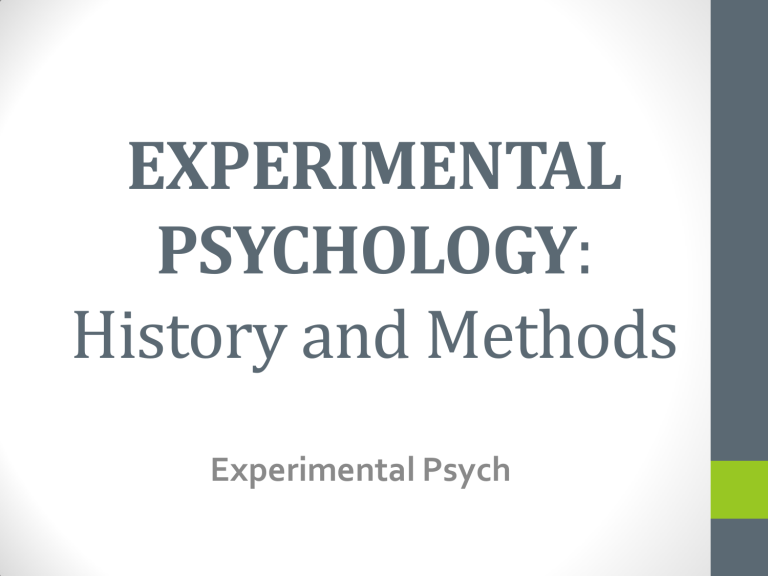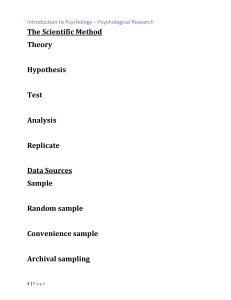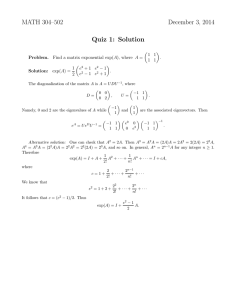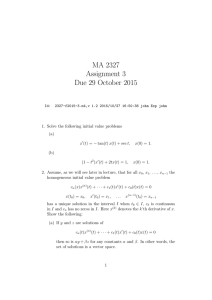
EXPERIMENTAL PSYCHOLOGY: History and Methods Experimental Psych OVERVIEW Experimental Psychology utilizes SCIENTIFIC METHODS to answer questions by researching the mind and behavior. OVERVIEW Experimental Psychologists CONDUCT EXPERIMENTS about why people do certain things. OVERVIEW Experimental methods allow researchers to CREATE and EMPIRICALLY TEST HYPOTHESES. OVERVIEW Researchers can also DEVELOP THEORIES that enable them to DESCRIBE, EXPLAIN, PREDICT, and EVEN CHANGE human behaviors. METHODS USED EXPERIMENTS Determine if there is a CAUSE-AND-EFFECT RELATIONSHIP between different VARIABLES METHODS USED EXPERIMENTS RANDOMLY ASSIGNING participants to groups METHODS USED EXPERIMENTS OPERATIONALLY DEFINING variables DEVELOPING a HYPOTHESIS METHODS USED EXPERIMENTS MANIPULATING the INDEPENDENT VARIABLE MEASURING the DEPENDENT VARIABLE METHODS USED EXPERIMENTS Example: Conducting a study to find out if sleep deprivation impairs performance on a driving test METHODS USED CASE STUDIES Allow researchers to STUDY a SINGLE individual or a GROUP of people in GREAT DEPTH METHODS USED CASE STUDIES Researcher collects EVERY SINGLE PIECE of DATA possible about the subject. METHODS USED CASE STUDIES DETAILED INFO about the individual’s BACKGROUND are collected. METHODS USED CASE STUDIES Such studies are often performed in instances where EXPERIMENTATION is NOT POSSIBLE. METHODS USED CASE STUDIES Example: A scientist might conduct a case study when the person of interest has had a unique or rare experience that could not be replicated in a lab. METHODS USED CORRELATIONAL RESEARCH Makes it possible for researchers to look at RELATIONSHIPS between different variables METHODS USED CORRELATIONAL RESEARCH Golden rule: CORRELATION DOES NOT EQUAL CAUSATION METHODS USED CORRELATIONAL RESEARCH A CORRELATION COEFFICIENT measures the strength of the relationship between two variables. METHODS USED CORRELATIONAL RESEARCH POSITIVE CORRELATION: as one variable increases, the other does, too. METHODS USED CORRELATIONAL RESEARCH (+) CORRELATION: The more years of education a person receives, the higher his yearly income. METHODS USED CORRELATIONAL RESEARCH NEGATIVE CORRELATION: as one variable increases, the other one decreases. METHODS USED CORRELATIONAL RESEARCH (-) CORRELATION: The more hours a student works during the week, the fewer A’s he gets in class. METHODS USED CORRELATIONAL RESEARCH The HIGHER the correlation coefficient, the STRONGER the correlation. METHODS USED CORRELATIONAL RESEARCH The LOWER the correlation coefficient, the WEAKER the correlation. METHODS USED CORRELATIONAL RESEARCH A correlation of ZERO means that NO RELATIONSHIP exists. METHODS USED NATURALISTIC OBSERVATION Gives researchers the OPPORTUNITY to OBSERVE people in their NATURAL environments METHODS USED NATURALISTIC OBSERVATION Can be particularly useful in cases where the investigators believe that a lab setting might have an undue influence on participant behaviors HISTORY of EXP. ψ WILHELM WUNDT (1874) published the first experimental psychology textbook Principles of Physiological Psychology. HISTORY of EXP. ψ WILLIAM JAMES (1875) opened a PSYCHOLOGY LAB in the United States The lab was created for class demonstrations, rather than to perform original experimental research. HISTORY of EXP. ψ WILHELM WUNDT (1879) the FIRST EXPERIMENTAL PSYCHOLOGY LAB was founded in Leipzig, Germany HISTORY of EXP. ψ G. STANLEY HALL (1883) opened the FIRST EXPERIMENTAL PSYCHOLOGY LAB in the United States at John Hopkins University HISTORY of EXP. ψ HERMANN EBBINGHAUS (1885) published his famous Über das Gedächtnis “ON MEMORY” HISTORY of EXP. ψ HERMANN EBBINGHAUS (1885) In the work, he described his LEARNING and MEMORY EXPERIMENTS which he conducted on himself. HISTORY of EXP. ψ GEORGE TRUBALL LADD (1887) published his textbook Elements of Physiological Psychology HISTORY of EXP. ψ GEORGE TRUBALL LADD (1887) Elements of Physiological Psychology: first American book to include a significant amount of info on experimental Ψ HISTORY of EXP. ψ JAMES MCKEEN CATTELL (1887) established the rd WORLD’s 3 EXPERIMENTAL PSYCHOLOGY LAB at University of Pennsylvania HISTORY of EXP. ψ WILLIAM JAMES (1890) published his classic textbook The Principles of Psychology HISTORY of EXP. ψ MARY WHITON CALKINS (1891) established an EXPERIMENTAL PSYCHOLOGY LAB at Wellesley College HISTORY of EXP. ψ MARY WHITON CALKINS (1891) the FIRST WOMAN to form a psychology lab HISTORY of EXP. ψ G. STANLEY HALL (1893) founded the AMERICAN PSYCHOLOGICAL ASSOCIATION, the largest professional and scientific organization of psychologists in the United States HISTORY of EXP. ψ JOHN B. WATSON & ROSALIE RAYNER (1920) conducted their now famous LITTLE ALBERT experiment HISTORY of EXP. ψ JOHN B. WATSON & ROSALIE RAYNER (1920) LITTLE ALBERT experiment: demonstrated that emotional reactions could be classically conditioned in people HISTORY of EXP. ψ EDWIN BORING (1929) published his book A History of Experimental Psychology. He was an influential experimental psychologist who was devoted to the use of experimental methods in psychological research. HISTORY of EXP. ψ LEE CRONBACH (1955) published Construct Validity in Psychological Tests, which popularized the use of construct validity in psychological studies HISTORY of EXP. ψ HARRY HARLOW (1958) published The Nature of Love, which described his experiments with rhesus monkeys on ATTACHMENT & LOVE HISTORY of EXP. ψ ALBERT BANDURA (1961) conducted his now famous Bobo Doll experiments, which demonstrated the effects of observation on aggressive behavior ETHICAL CONSIDERATIONS IN CONDUCTING A RESEARCH INFORMED CONSENT Participation in a study must be VOLUNTARY, and participants must FULLY UNDERSTAND the nature of their involvement. ETHICAL CONSIDERATIONS IN CONDUCTING A RESEARCH INFORMED CONSENT They need to know the AIMS of the study, what TASKS they will be exposed to and how the DATA will be used. ETHICAL CONSIDERATIONS IN CONDUCTING A RESEARCH INFORMED CONSENT Researchers should PROVIDE AS MUCH INFORMATION as possible and in the clearest possible way. ETHICAL CONSIDERATIONS IN CONDUCTING A RESEARCH DEBRIEFING After the study, participants must be fully informed about its nature, its TRUE AIMS, how the DATA will be USED and STORED. ETHICAL CONSIDERATIONS IN CONDUCTING A RESEARCH DEBRIEFING They must be given an OPPORTUNITY to REVIEW their RESULTS and WITHDRAW the DATA if they want to. ETHICAL CONSIDERATIONS IN CONDUCTING A RESEARCH DEBRIEFING IF DECEPTION WAS USED, IT MUST BE REVEALED. Care must be taken to protect participants from any possible harm. ETHICAL CONSIDERATIONS IN CONDUCTING A RESEARCH ANONYMITY and CONFIDENTIALITY Participation in a research study is CONFIDENTIAL if there is someone who can connect the results of the study to the identity of a particular participant. ETHICAL CONSIDERATIONS IN CONDUCTING A RESEARCH ANONYMITY and CONFIDENTIALITY Participants provide personal data, but the data stays confidential under the research agreement. ETHICAL CONSIDERATIONS IN CONDUCTING A RESEARCH ANONYMITY and CONFIDENTIALITY Participation is ANONYMOUS if no one can trace the results back to a participant’s identity because no personal details have been provided. ETHICAL CONSIDERATIONS IN CONDUCTING A RESEARCH ANONYMITY and CONFIDENTIALITY An example of anonymity would be filling out an online survey without providing your name. ETHICAL CONSIDERATIONS IN CONDUCTING A RESEARCH DECEPTION In many cases, the true aims of the study cannot be revealed to the participants because it would change their behavior. ETHICAL CONSIDERATIONS IN CONDUCTING A RESEARCH DECEPTION A degree of deception needs to be used. In some research methods, deception is part of the process. ETHICAL CONSIDERATIONS IN CONDUCTING A RESEARCH DECEPTION Researchers must be careful and if deception is used, it must be kept to the NECESSARY MINIMUM. ETHICAL CONSIDERATIONS IN CONDUCTING A RESEARCH WITHDRAWAL FROM PARTICIPATION It must be made known to participants that because their participation is voluntary, they are FREE TO WITHDRAW FROM THE STUDY AT ANY TIME THEY WANT. ETHICAL CONSIDERATIONS IN CONDUCTING A RESEARCH WITHDRAWAL FROM PARTICIPATION Researchers must not prevent participants from withdrawing or try to convince them to stay. ETHICAL CONSIDERATIONS IN CONDUCTING A RESEARCH PROTECTION FROM HARM At all times during the study, participants must be PROTECTED from PHYSICAL and MENTAL HARM. ETHICAL CONSIDERATIONS IN CONDUCTING A RESEARCH PROTECTION FROM HARM This includes possible negative long-term consequences of participating in a research study. APPLICATIONS of EXP. ψ Developmental Psychologists use experimental methods to study how people grow through childhood and over the course of a lifetime. APPLICATIONS of EXP. ψ Social Psychologists utilize experimental techniques to study how people are influenced by groups. APPLICATIONS of EXP. ψ Health Psychologists rely on experimentation and research to better understand the factors that contribute to wellness and disease. Sources: •https://www.verywellmind.com/ what-is-experimental-psychology2795784 •http://www.sparknotes.com/psyc hology/psych101/researchmetho ds/section3/


